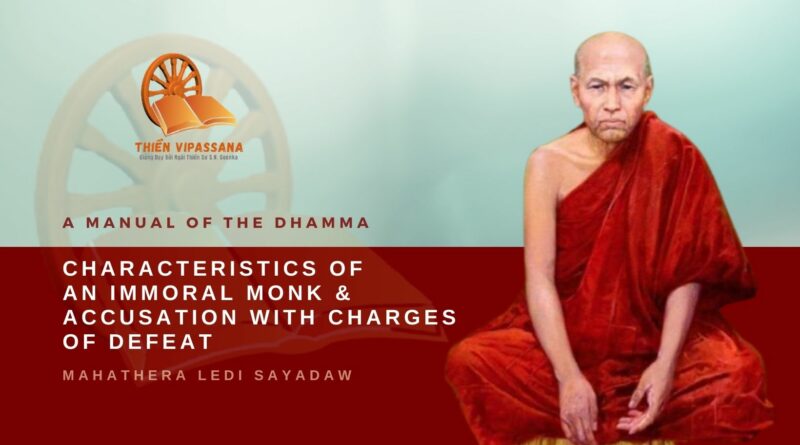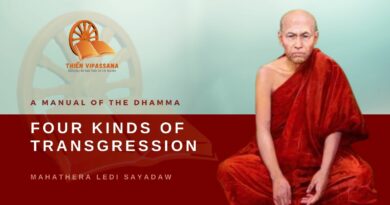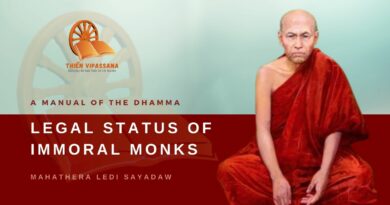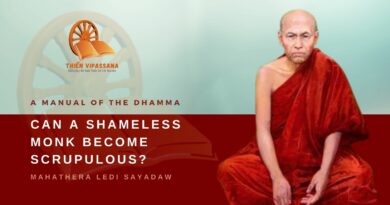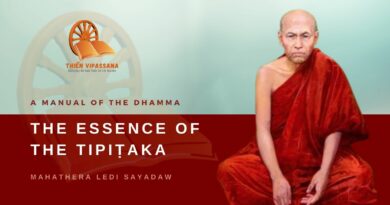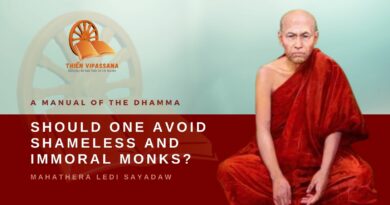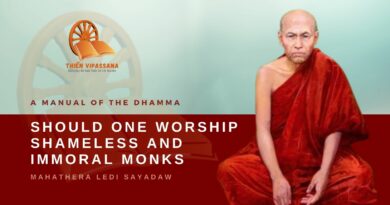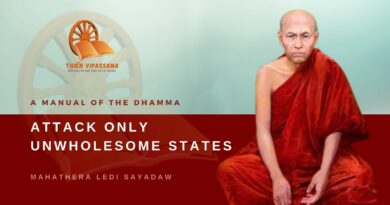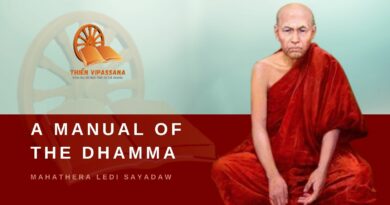Characteristics of an Immoral Monk
The technical term “immoral (dussīlo)” means a totally depraved monk who commits an offence of defeat (pārājika). The Duṭṭhadosa Sikkhāpada states “If a monk, being angry, and wanting to make another monk disrobe, falsely accuses him of defeat, he commits an offence requiring a formal meeting of the Saṅgha.” He commits a serious evil by his accusations against an immoral monk who has committed an offence of defeat. If a monk, without the aim of expelling an immoral monk, merely accuses or belittles him so that his honour and power will be extinguished, he commits an offence requiring confession (pācittiya āpatti). Even if he abuses or speaks ill of an immoral monk, he transgresses the pācittiya rule.
Accusation with Charges of Defeat
Words spoken against an immoral monk with the following charges mean “speaking ill or accusation.”
“You have committed an offence of defeat.”
“You possess no moral conduct.”
“You are not a monk at all.”
“You are not a son of the Sakyan clan.”
Such expressions used against a monk are charges of defeat as mentioned in the Commentary.
The term “shameless” (alajjī) includes an immoral monk who has fallen into an offence of defeat. However, the text says that a shameless one transgresses minor offences (dukkaṭa). So the term “shameless” covers both great and small offences. Therefore if a monk speaks ill of someone only as “shameless” he escapes the serious offence of Saṅghādisesa. As the Vinaya texts and Commentaries give precise examples, only those monks who have committed an offence of defeat should be classified as “immoral.”
Those monks who do not commit any offence of defeat, but who occasionally break other precepts are not immoral monks, though they are shameless if the requisite factors are present. Apart from offences of defeat, other offences do not confer immoral status, so “shameless” and “immoral” monks are clearly quite different. The way to distinguish them has been explained already.
In the Vinaya Commentary the term “dummaṅkū — wicked” is used in the phrase “Dummaṅkūnaṃ puggalānaṃ niggahāya — for the restraint of wicked men.” So a shameless monk can also be called “wicked.” Among shameless monks two distinct types can be defined: immoral and shameless (dussīla alajjī) and ordinary shameless monks (samanya alajjī).
In the matter of offences of defeat one must classify a monk as immoral and shameless. In cases dealing with other offences only the ordinary shameless (samanya alajjī) classification appears, which is called “wicked.” For a defeated monk is definitely an immoral monk, not just a shameless one.
The term “wicked” has been explained in two ways in the Vimati Ṭīkā, a Vinaya Subcommentary. It says that after committing an offence of defeat a monk becomes a totally bad one — that is completely without moral conduct. If a monk breaks only the other rules, partially he is good. Total depravity cannot be assigned to him. He is immoral only to some extent. So he is partially moral and partially immoral. Even those monks who commit light offences of wrong-doing or wrong speech, fall into the category of immoral (dussīla).
It is clear, according to this Subcommentary, that a monk can more easily become immoral than shameless. So this explanation is unreasonable. This explanation is contrary to the teaching of the great Commentaries and famous Subcommentaries, which unanimously declare that an immoral monk lacks morality — “dussīlassāti nissīlassa dussīlo’ti” (Commentary on ‘nissīlo’). All the great Vinaya Commentaries agree in commenting on the words “asamaṇo asakyaputtiyo” from the Duṭṭhadosa Saṅghādisesa precept that an immoral monk lacks all morality. So the Vimati Ṭīkā’s words are against the spirit of the great Commentaries and Subcommentaries. It is not surprising that competent Vinaya masters reject this exposition of the Vimati Ṭīkā.
The term “dussīla puggala — an immoral individual,” means one who has transgressed a Pārājika rule and so lacks all disciplinary virtues — a defeated monk. As long as this defeated monk does not admit his offence and still associates with genuine monks, accepting food and other alms, he is automatically classified as immoral. If he confesses his fault, he immediately escapes from the category of immoral, and also from a monk’s status.

